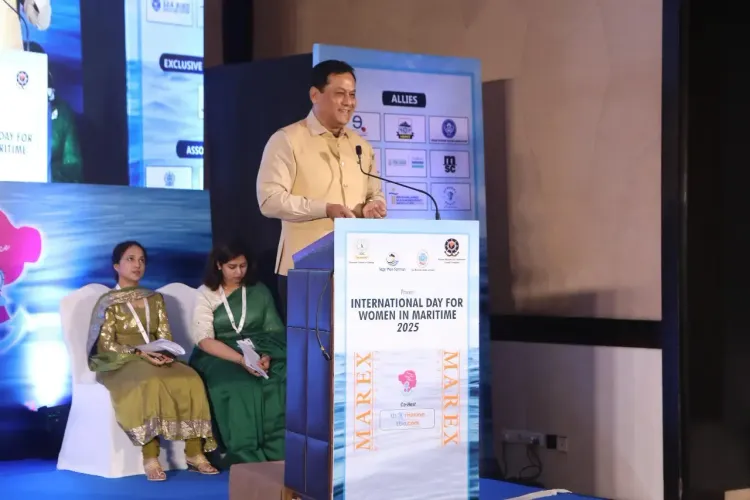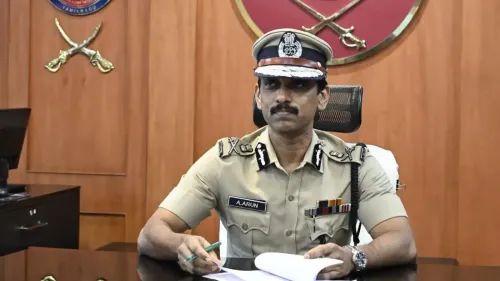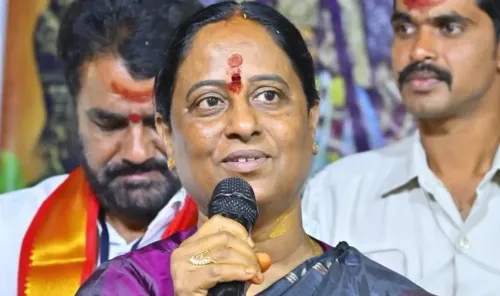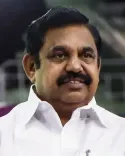How is the Centre Promoting Women's Employment in the Maritime Sector?

Synopsis
Key Takeaways
- Sagar Mein Samman initiative launched to empower women in maritime.
- Target of 12% female representation in maritime roles by 2030.
- Women seafarers in India increased from 341 in 2014 to 2,557 in 2024.
- Focus on leadership, safety, and skill development.
- Aligns with DEI and UN SDGs.
Mumbai, May 18 (NationPress) The Union Minister of Ports, Shipping and Waterways, Sarbananda Sonowal, introduced the Sagar Mein Samman initiative, a governmental policy aimed at enhancing women's participation in the maritime field.
This initiative was launched during the inaugural celebrations of the International Day for Women in Maritime, promoting messages of inclusivity, transformation, and sustainability within the maritime industry.
During the event, Sonowal remarked, “This day is significant for recognizing women through their recruitment, retention, and sustained employment in the maritime field. This year, the International Maritime Organisation (IMO) emphasizes the theme: ‘An Ocean of Opportunities for Women.’ We must reflect and work on elevating women's profiles in maritime roles and bolstering their presence.”
“The launch of the Sagar Mein Samman policy framework focuses on empowerment, leadership, inclusivity, safety, skill development, and the removal of gender-based obstacles in maritime careers. Our ambitious goal is to achieve 12 percent female representation in technical maritime positions by 2030,” the minister stated.
He also pointed out that India’s maritime sector has experienced a remarkable increase in women seafarers, rising from just 341 in 2014 to approximately 2,557 in 2024, marking a growth of 649 percent. Since 2014, around 2,989 women seafarers have received financial support. The government's persistent efforts to motivate women to pursue maritime careers have seen the number of women seeking financial aid rise from only 45 in 2014-15 to 732 in 2024-25. The involvement of Indian female seafarers on both Indian and foreign-flagged vessels is on an upward trend.
Sonowal emphasized, “Empowering women in the maritime sector transcends equity—it is a strategic imperative. Their leadership fosters innovation, resilience, and a more sustainable future for the industry. Our Nari Shakti is a crucial pillar of the new India, given their significant contributions to nation-building.”
“Advancing women's roles in various sectors remains a priority for Prime Minister Narendra Modi. The Maritime India Vision 2030 document envisions the 'Women in Seafarer' program, which aims to promote onshore employment, awareness campaigns, incentivize shipping firms, and leverage scholarships to boost women's involvement. We are dedicated to turning this vision into a reality,” he affirmed.
The Sagar Mein Samman (SMS) initiative is designed to foster an environment that encourages more women to enter the maritime field.
The SMS policy aspires to create a future where women’s involvement is fundamental to all maritime operations, from the docks to decision-making boards. To close the gender gap in both seafaring and land-based roles, this policy offers a structured roadmap for increasing women's participation while addressing safety, leadership, and retention challenges in the Indian maritime sector.
This program also aligns with the government’s DEI (Diversity, Equity and Inclusion) objectives. The policy's broad scope includes planning and strategy, training and development, research and development, governance and compliance, communications, and community outreach. It aims to achieve goals such as empowerment and leadership, inclusivity and equal opportunity, safety and well-being, and skill development and training for women in the maritime industry.
This celebration underscores India’s commitment to the International Maritime Organisation’s (IMO) mission for gender inclusion and resonates with the broader goals of the UN Sustainable Development Goals (SDGs).








